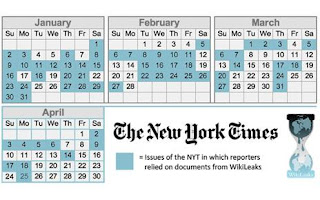 by Caitlin Dickson
by Caitlin Dickson The New York Times prominently features "The Guantanamo Files," a synthesis of "700 classified military documents" obtained by WikiLeaks, about the Cuba prison's current and former inmates. It's the latest blockbuster data cache to be trumpeted by the paper. And though the paper has had a complicated relationship with the secret-sharing site run by Julian Assange since the two partnered up for a post-Thanksgiving barrage of "State's Secrets" last year, the paper has become increasingly reliant on its documents.
By our count, on 63 days so far this year the paper's reporters have relied on WikiLeaks documents as sources for their stories. Since April 25th is the 115th day of the year, that's over half of all their issues this year. And just to be clear, we didn't count stories that merely mentioned WikiLeaks or Julian Assange or Bradley Manning, only the ones that used documents from the site as a reporting source.
It now seems routine for WikiLeaks to serve as a source when it comes to American diplomacy, especially regarding the Middle East. Sometimes these stories are billed as revelations from WikiLeaks' cache, such as the March 2 story by James Risen on the Qaddafi sons' bitter business battles which was headlined, "2 Qaddafis Fought Over Business, Cables Show." But often the WikiLeak-ed documents are used as a stand-in for an American diplomatic spokesperson, source or expert. A typical example is the recent feature on Muammar Qaddafi's illegitimate means of acquiring wealth. The seventh paragraph of the front-page story reads:
The government not only exploited corporations eager to do business, but willing governments as well. Libya’s banks apparently collected lucrative fees by helping Iran launder huge sums of money in recent years in violation of international sanctions on Tehran, according to another cable from Tripoli included in a batch of classified documents obtained by WikiLeaks. In 2009, the cable said, American diplomats warned Libyan officials that its dealings with Iran were jeopardizing Libya’s enhanced world standing for the sake of “potential short-term business gains.”And it's not just Libya. Times readers have learned about Cairo's top military officials wrestling for control of post-Mubarak Egypt, Pakistan's nuclear might, and American diplomats' role in selling Boeing jetliners to foreign leaders all thanks to WikiLeaks.